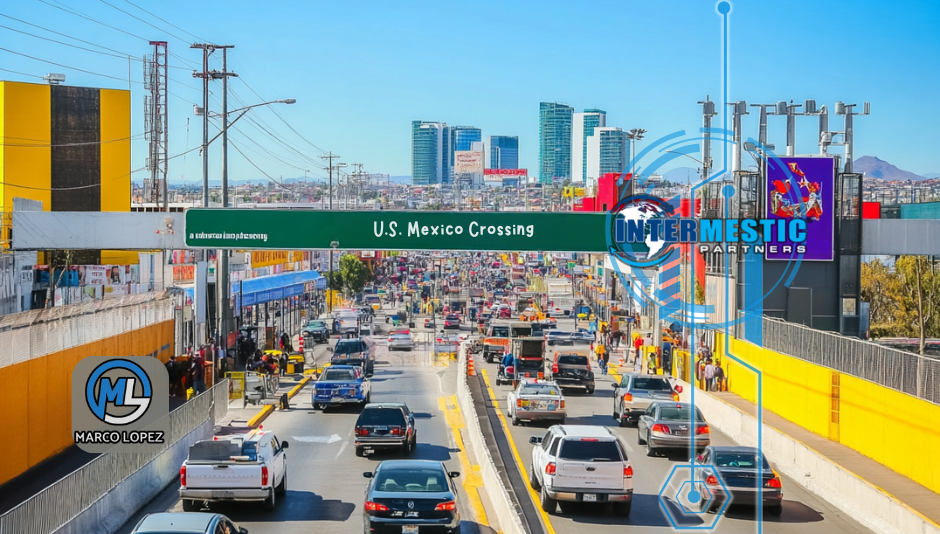From Divide to Drive: How the U.S.-Mexico Border Can Fuel Economic Power
- Marco Lopez

- Apr 15, 2025
- 2 min read

Rethinking the Border as an Economic Engine
The U.S.-Mexico border is too often framed through the lens of conflict—immigration, crime, and cartels dominate the headlines. But this 2,000-mile stretch, home to dynamic binational cities like San Diego–Tijuana and El Paso–Juárez, holds untapped potential to become a globally competitive economic corridor.
As a former mayor of a border city in Arizona and Chief of Staff at U.S. Customs and Border Protection, I’ve seen firsthand how policies and perception shape opportunity. Today, as CEO of Intermestic Partners, an international advisory firm founded in 2011 specializing in cross-border trade and development, I work with global companies to turn this region’s complexity into opportunity.
The Current Border Reality
Bureaucracy & bottlenecks slow trade across ports of entry
Outdated infrastructure struggles under modern demand
Security-centric policies stall investment and frustrate binational collaboration
Despite thriving sectors—manufacturing, logistics, agriculture—the region lacks a unified vision to activate its full potential.
What Makes the Border Unique?
Strategic geography: A launchpad for trade across the Americas
Workforce edge: Bilingual, binational, and deeply entrepreneurial
Industrial base: Cross-border supply chains already exist—especially in sectors like autos, electronics, and agriculture
The El Paso–Juárez region is home to more than 350 manufacturing plants, employing over 300,000 workers—a model of binational cooperation already in motion.
How We Unlock Growth
1. Streamline Trade
Digitize and simplify customs processes
Reduce wait times with smart ports and logistics tech
2. Incentivize Investment
Offer tax credits and regulatory clarity
Promote EB-5 and nearshoring pathways
3. Build the Workforce
Invest in vocational training and binational education programs
Retain local talent through quality jobs and innovation hubs
4. Empower Public-Private Collaboration
As seen in past work—from U.S. Customs to Arizona's Commerce Department—policy needs business. Intermestic Partners bridges both.
The Ripple Effects
Jobs created across both sides of the border
Safer communities through economic inclusion
Stronger bilateral ties between the U.S. and Mexico
Economic growth won’t solve every issue—but it can turn migration into mobility, and division into connection.
The Call to Act
It’s time to reimagine the border not as a barrier—but as a gateway. Let’s rally policymakers, business leaders, and community stakeholders to co-create a new North American growth model—rooted in cooperation, not confrontation.
Ready to shape the future of the U.S.-Mexico border economy?Let’s connect and explore what’s possible—together.
.png)




Tired of the endless scrolling for home inspiration? A great home is all about personalization! You can now find and collaborate with amazing online interior designers who can bring your unique vision to life—all from the comfort of your couch.
Ready to start your design journey? Check out the link in our bio to find your perfect match and get a home that's truly yours. ✨Looking for top interior designers in Bangalore? Find your perfect match. Browse curated profiles, stunning portfolios, and client reviews to start your dream project today.
TSO777
SLOT GACOR
SLOT TOTO
SLOT QRIS
TOTO TOGEL
SLOT777
SLOT MAXWIN
SITUS SLOT
SITUS TOTO
SITUS GACOR
SITUS TOTO TOGEL
SITUS SLOT QRIS
SITUS SLOT ONLINE
TSO777 LOGIN
TS77CASINO
TS77CASINO DAFTAR
TSO777SPORTS
TSO777SPORTS LOGIN
GACOR777
LINK ALTERNATIF SLOT GACOR
SLOT88
LINK ALTERNATIF SITUS TOTO GACOR
RTP LIVE SLOT
LOGIN TSO777
DAFTAR TSO777
AGEN TSO777
SITUS TSO777
LINK ALTERNATIF TSO777
LINK TSO777
SLOT TSO777
TSO777 LOGIN
TSO777 DAFTAR
TSO777 AGEN
TSO777 SLOT
TSO777 LINK ALTERNATIF
RTP SLOT HARI INI
tso777 slot login
tso777 agen slot gacor
tso777 alternatif login
rtp tso777
tso777 agen slot
rtp tso777 hari ini
tso777 slot rtp
tso777 rtp
tso777 slot login link alternatif
As a former mayor of a border city in Arizona and Chief of Staff at U.S. Customs and Border Protection, I’ve seen firsthand how policies and perception shape opportunity. Today, as CEO of Cisco 300-415 Questions Answers Partners, an international advisory firm founded in 2011 specializing in cross-border trade and development, I work with global companies to turn this region’s complexity into opportunity.